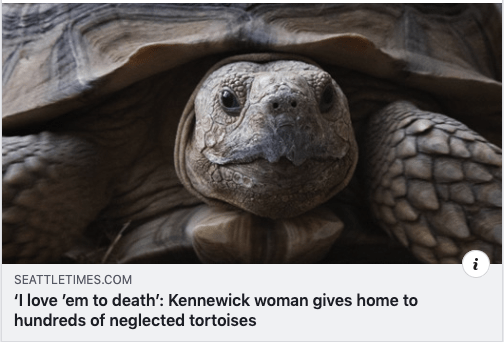I need your help for day-to-day operations expenses such as power, water, building materials for indoor and outdoor pens, food, food and more food! Nutritional supplements, veterinary care, medications, reference books, transport: both picking up rescues and/or delivering adopted animals or shipping them, bedding materials, tools for trimming beaks or nails, UVA/UVB lights, heat emitters, etc.
I had a surprise this fall. The last thing I expected to be dealing with is the arrival of eight Sulcatas of varying sizes and health statuses in the space of two weeks! As you may know Sulcatas are the largest tortoise next to the Galapagos tortoise! The housing required and the amount of food is immense! They are hard to rehome because few people truly understand and are willing to do what it takes to keep a Sulcata for life. These animals are already a strain on the finances.
Northwest Tortoise is funded in part by selling my captive bred yearlings to approved homes (I won’t sell until they are a year old, I also don’t breed any species already in rescues!) and adoption fees. Selling yearlings is not a steady source of income because I don’t produce very many. I produce only what I can house and feed in the long term. Because I’m so picky about who owns one of my animals it can take 1-3 years to sell them. The main funding comes from tax-deductible donations.
Please consider donating to Northwest Tortoise. Any amount is greatly appreciated.
About Northwest Tortoise
Long ago and far away I got my first tortoise. I went to a reptile show, bought one, cared for it exactly like the breeder advised and buried her 13 years later.
What happened? What did I do? She didn’t look sick at all. There had to be an answer. After doing a lot of research I found out everything the breeder told me about care, and how I was caring for her, was wrong. How could a breeder be wrong? Aren’t they the experts?!
It was a painful reality check for me. The retail reptile industry is about profit. The more sales, the greater profit. It’s a retail business. It doesn’t matter if the animal lives a full life or not.
Side note: Not every person/business in the reptile industry falls into the above category. There are some great people/businesses out there doing great things for the responsible keeping of reptiles and specifically tortoises.
Fast-forward 20 years…
I’ve learned a lot since then. I learned about the different species and how to care for them. I learned where they came from in the retail pet trade. I learned so much I started getting a few more tortoises and ended up with a potential breeding group.
After another 10 years I started breeding.
Breeding was a success, and after a few reptile shows two things became immediately apparent to me:
- The industry hadn’t changed at all. It was still about selling tortoises for profit. I had a breeder tell me ‘you just know some are doomed.’ Not something I could accept.
- I was quickly becoming the ‘go to’ person for correct information. The retail vendors were sending their buyers to me to explain care so they didn’t have to take the time away from making another sale.
Thus the non-profit Northwest Tortoise was created. I could not bring animals into this world to ‘be doomed.’ I could not operate like the retail vendors. I would not be forced to sell for profit to satisfy a bottom line. I would not import and sell a wild tortoise, as is the norm. I know it is a bad business plan but I won’t budge on my mission.
Being a non-profit allows me to spend as much time as necessary with potential owners (it also allows me to say no to some because I’m not confident they understand the commitment, or care to). It allows me to spend as much time as necessary educating whoever wants to learn. It allows me to research and dive into learning new and interesting things about tortoises, and most of all it allows me to rescue.
Becoming a rescue
Becoming a rescue has been a steep learning curve. Not only is it taxing on financial resources, available space and current knowledge, it’s quickly becoming much bigger than I ever imagined. I had a few people drop off tortoises at shows but as the word got out there was a resource in eastern Washington state the rescues flooded in and continue to do so.
I never imagined I would have to deal with a Russian with a hole through his shell, a Sulcata so emaciated she was on the brink of death, an Ornate box turtle that had so many birth defects and deformities I named him Fubar, or just the number of others that have come through my door for whatever reason. I never thought I’d know the pain of bringing one back from the brink only to lose them a few years later because their body was so damaged growth was impossible. I never thought I’d be picking maggots out of an injured tortoise at 3 a.m! I never thought I’d be a rescuer, but I am and the need doesn’t stop.
Thanks again for your time and please consider supporting Northwest Tortoise.

